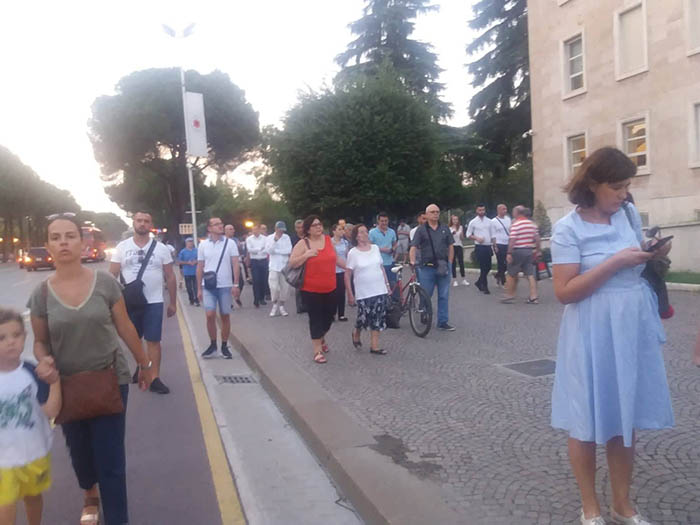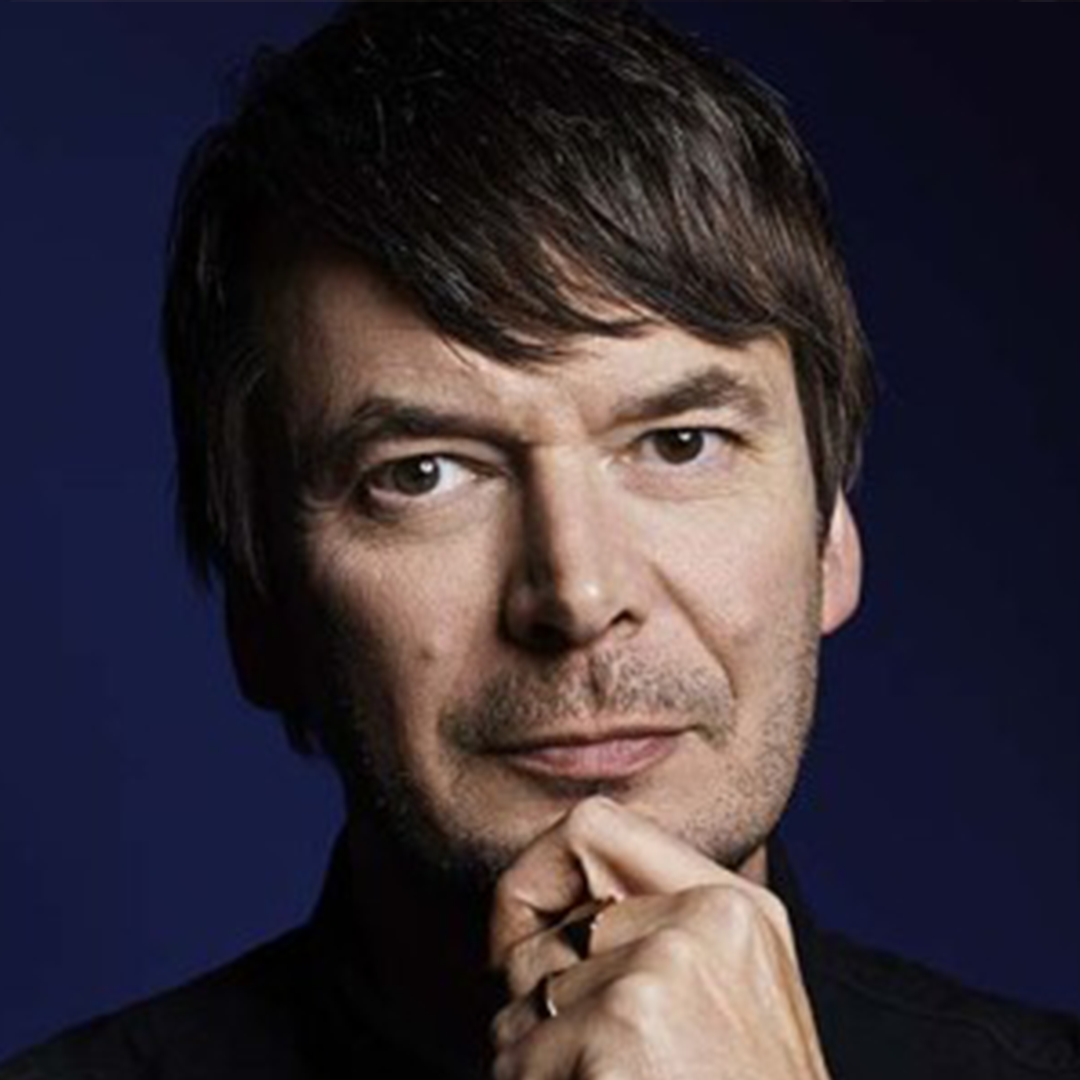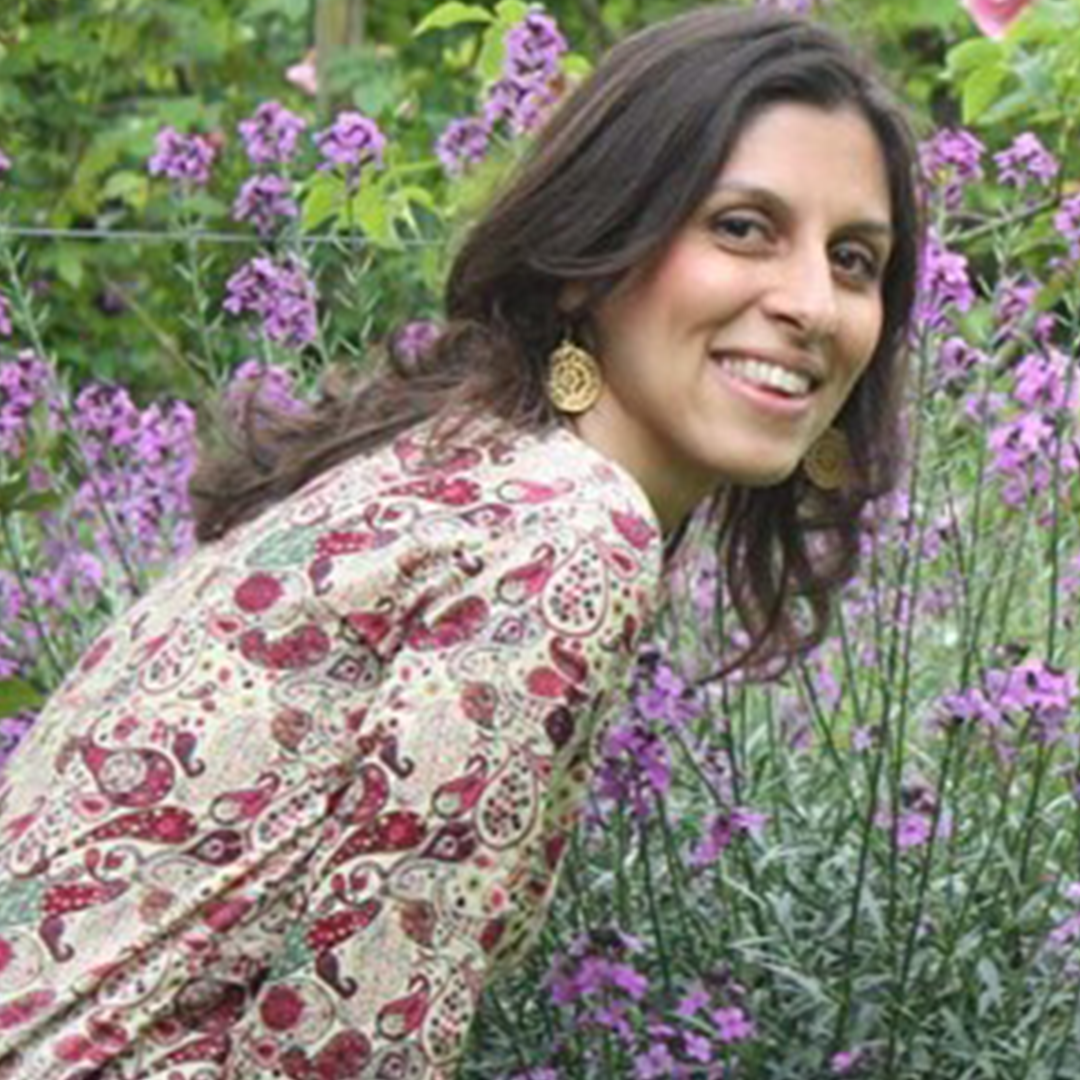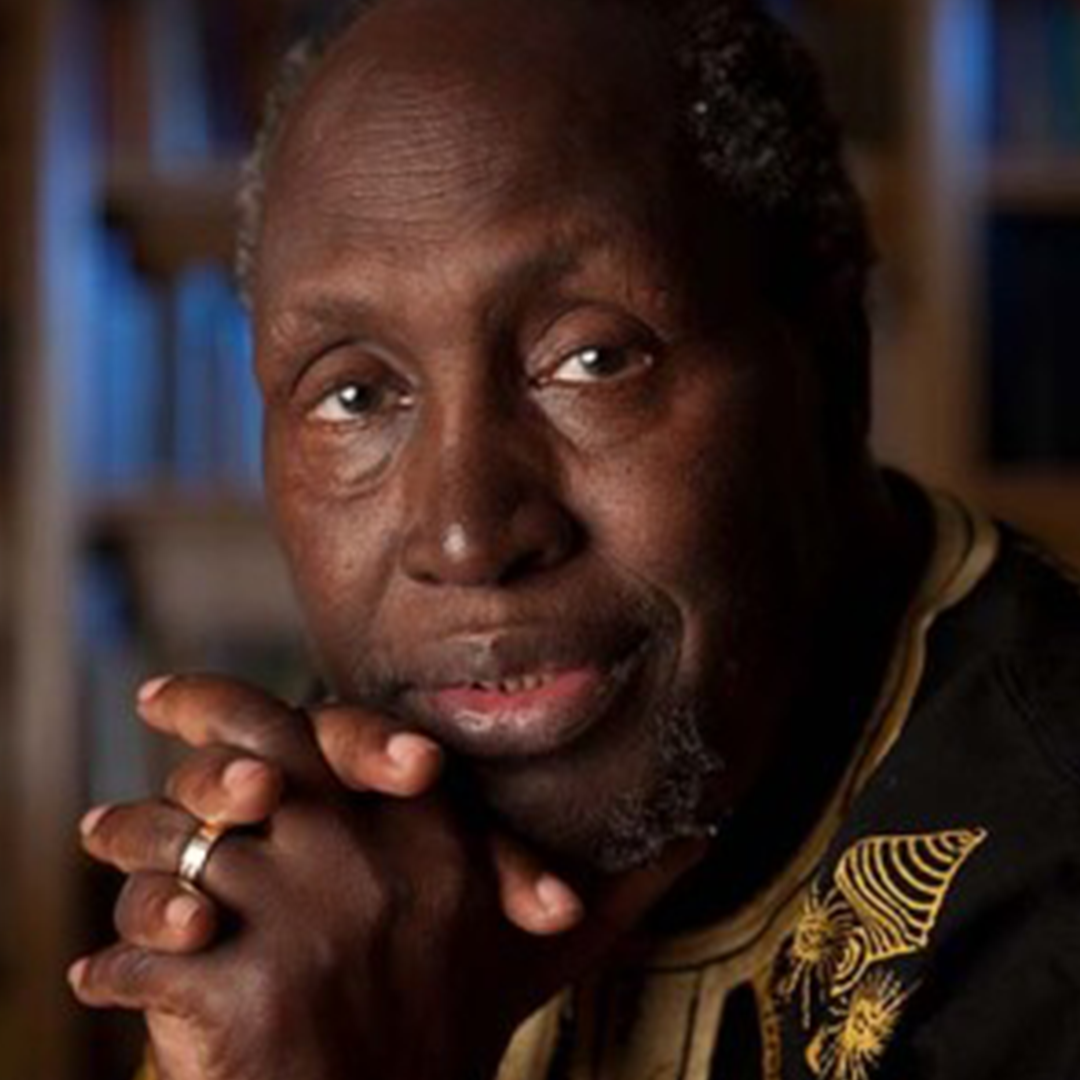Index relies entirely on the support of donors and readers to do its work.
Help us keep amplifying censored voices today.
[vc_row][vc_column][vc_column_text]

A small protest by journalists and citizens after the attack on Klodina Lala’s parental home. Credit: Fjori Sinoruka
In the early hours of 30 August, investigative journalist Klodiana Lala’s parental home was sprayed with bullets. Luckily no one was injured.
Lala, a crime reporter for Albania’s News 24 TV, connected the incident with her work as a journalist, saying that neither she nor her family had any personal conflicts that would spur this type of incident. The attack drew rapid condemnation and calls to bring the perpetrators to justice from concerned citizens and politicians, including the country’s prime minister, Edi Rama, who described it as a “barbarous” act. He pledged that the authorities would spare no efforts to investigate the attack.
Rama’s fine words about this attack belie the reality of most crimes against journalists in Albania: identification and prosecution rates of perpetrators are near zero.
When City News Albania’s editor Elvi Fundo was brutally assaulted at 11am in crowded central Tirana, he too received solidarity from the country’s politicians and press, including a note from Rama. But 17 months later, those expressions of support haven’t translated into action from prosecutors.
The attack on Fundo, in which he was beaten with iron bars by two men in hoodies just metres from his office, left him unconscious with serious injuries to his head and an eye.
To add insult to his injuries, Fundo was told on 31 August 2018 that prosecutors were suspending the investigation into his assault because of the lack of suspects.
“This is a grotesque decision. Investigations are not conducted thoroughly. I had to force authorities to seek out more footage from the bars around the area after I left the hospital. They didn’t seem very keen to do so,” he said.
Fundo’s lawyer challenged the decision in court, emphasising that he has given prosecutors information, he said, that can lead investigators to those that ordered the attack.
“I will never stop pushing them to bring the authors of the assault on me to justice since this is not a case lacking in information. I believe the police and prosecutors are just afraid of those who ordered the attack on me,” he said.
While intimidation is a criminal offence in Albania and is punishable by a fine or up to two years in prison, journalists find themselves without much support when they are threatened due to their professional duties.
Very often, prosecutors are reluctant to even open a case and when they do are eager to drop the charges, as was the case against a man who threatened a journalist on Facebook.
Dashamir Bicaku, a crime reporter who acted as a fixer and translator for a Daily Mail journalist, received an anonymous threatening message on June 17 2018 via his Facebook account. The threat came two days after the Mail published an investigation into Elidon Habilaj’s fraudulent asylum claim and subsequent career in British law enforcement, for which Habilaj was convicted and sentenced to 18 months in absentia.
“I’ll come straight to the point! I’ll come and get you so that there’ll be nothing left of you and yours!”, the message read. He reported the incident to the police the next day, alleging to law enforcement that Habilaj was the only person who would have a motive to threaten him.
But on 31 July 2018, he received a letter from the Vlora prosecutor’s office telling him that they had decided not to open an investigation into the case. According to Bicaku, the prosecutors said that Habilaj had denied sending a threatening message to the journalist and — even if he had — the message was not serious.
A few days later Bicaku learned that a close relative of Habilaj was working as a prosecutor in the same unit.
“What happened is a clear signal about the connections that those involved in organised crime have with people in the justice system,” Bicaku said.
Even when the aggressor has been clearly identified, negligence by the investigating institution makes appropriate punishment difficult.
Julian Shota, a correspondent of Report TV, was threatened with a gun by Llesh Butaku, the owner of a bar in the town of Lac where an explosion had taken place. When the journalist identified himself, Butaku demanded that he leave and not report the incident. When Shota refused, Butaku loaded a gun and pointed it at the journalist’s head.
Shota said he was saved by Butaku’s relatives, who grabbed his hand to prevent him from shooting. The journalist immediately reported the incident to police, but three hours passed before they arrived to detain Butaku.
“In three hours you can hide a rocket let alone a handgun,” Shota said. “The prosecutor received me in his office telling me clearly that I should not expect a lot since no gun was found on him.”
After seven hours Butaku released and the charge for illegal possession of firearms, which could have carried a prison sentence, was dropped.
“Instead of being investigated for attempted murder, Butaku is only being investigated for making threats,” he said.
Artan Hoxha, a prominent investigative journalist with over 20 years of experience, remembers tens of case when he was threatened because of his job, but that “every single case was suspended without any success”.
“I rarely report the threats that I receive to the authorities anymore. I know it is not worth even to bother doing so,” he said.
Part of the problem is that the Albanian judicial system is considered one of the most corrupt in Europe. It is currently undergoing a radical reform overseen by international experts in which all the country’s judges and prosecutors are being put through a vetting process.
As of August, 45 judges and prosecutors have been evaluated. Twenty-one failed and will be unable to continue to work in the judicial system.
Dorian Matlija, attorney and executive director at Res Publica, a centre for transparency, considers the prosecution the most problematic branch of the judicial system.
“Journalists are right, the prosecution is infamous for its bad work and it is one of the less scrutinised institutions over its decisions despite having a lot of power within the system,” he said.
According to Matlija, when journalists received death threats or are sued, they often find themselves alone.
“They have difficulties accessing and navigating the judicial system while the media owner is often the first to abandon them to keep trouble at bay,” Matlija said.
To remedy this, he said that is very important to create free legal help for journalists, not only when they face prosecution, and also to push for employment rights.
Journalists consider the lack of judicial protection a big obstacle in continuing doing investigative journalism in Albania.
“Is very difficult to investigate organised crime in Albania, since you don’t have the minimum protection and media owners can throw you out in the first place,” Bicaku said.[/vc_column_text][/vc_column][/vc_row][vc_row][vc_column][vc_basic_grid post_type=”post” max_items=”4″ element_width=”6″ grid_id=”vc_gid:1537456192915-fc339c8f-4676-3″ taxonomies=”6564″][/vc_column][/vc_row]
[vc_row][vc_column][vc_custom_heading text=”With contributions from Ian Rankin, Herta Müller, Peter Sands, Timandra Harkness, David Ulin, John Lloyd, Sheng Keyi and Nazanin Zaghari-Ratcliffe”][/vc_column][/vc_row][vc_row][vc_column][vc_column_text]
[/vc_column_text][/vc_column][/vc_row][vc_row][vc_column][vc_single_image image=”102490″ img_size=”full”][/vc_column][/vc_row][vc_row][vc_column][vc_column_text]
[/vc_column_text][/vc_column][/vc_row][vc_row][vc_column][vc_custom_heading text=”Special Report: The Age of Unreason”][/vc_column][/vc_row][vc_row][vc_column][vc_column_text]
[/vc_column_text][/vc_column][/vc_row][vc_row][vc_column][vc_custom_heading text=”Global View”][vc_column_text]
[/vc_column_text][/vc_column][/vc_row][vc_row][vc_column][vc_custom_heading text=”In Focus”][vc_column_text]
[/vc_column_text][/vc_column][/vc_row][vc_row][vc_column][vc_custom_heading text=”Culture”][vc_column_text]
[/vc_column_text][/vc_column][/vc_row][vc_row][vc_column][vc_custom_heading text=”Column”][vc_column_text]
[/vc_column_text][/vc_column][/vc_row][vc_row][vc_column][vc_custom_heading text=”Endnote”][vc_column_text]
[/vc_column_text][/vc_column][/vc_row][vc_row][vc_column width=”1/3″][vc_custom_heading text=”Subscribe”][vc_column_text]In print, online. In your mailbox, on your iPad.
Subscription options from £18 or just £1.49 in the App Store for a digital issue.
Every subscriber helps support Index on Censorship’s projects around the world.
![]() SUBSCRIBE NOW[/vc_column_text][/vc_column][vc_column width=”1/3″][vc_single_image image=”102479″ img_size=”medium”][/vc_column][vc_column width=”1/3″][vc_custom_heading text=”Listen”][vc_column_text]The Autumn 2018 magazine podcast, featuring interviews with Academy of Ideas founder and director Claire Fox, Tanzanian blogger Elsie Eyakuze and Budapest-based journalist Dan Nolan.
SUBSCRIBE NOW[/vc_column_text][/vc_column][vc_column width=”1/3″][vc_single_image image=”102479″ img_size=”medium”][/vc_column][vc_column width=”1/3″][vc_custom_heading text=”Listen”][vc_column_text]The Autumn 2018 magazine podcast, featuring interviews with Academy of Ideas founder and director Claire Fox, Tanzanian blogger Elsie Eyakuze and Budapest-based journalist Dan Nolan.
LISTEN HERE[/vc_column_text][/vc_column][/vc_row]
FEATURING

Author

Poet

Writer and professor
[vc_row][vc_column][vc_single_image image=”95198″ img_size=”full” add_caption=”yes”][vc_column_text]For the second time since 2013, the United Nations (UN) Working Group on Arbitrary Detention (WGAD) has issued an Opinion regarding the legality of the detention of Mr. Nabeel Rajab under international human rights law.
In its second opinion, the WGAD held that the detention was not only arbitrary but also discriminatory. The 127 signatory human rights groups welcome this landmark opinion, made public on 13 August 2018, recognising the role played by human rights defenders in society and the need to protect them. We call upon the Bahraini Government to immediately release Nabeel Rajab in accordance with this latest request.
In its Opinion (A/HRC/WGAD/2018/13), the WGAD considered that the detention of Mr. Nabeel Rajabcontravenes Articles 2, 3, 7, 9, 10, 11, 18 and 19 of the Universal Declaration on Human Rights and Articles 2, 9, 10, 14, 18, 19 and 26 of the International Covenant on Civil and Political Rights, ratified by Bahrain in 2006. The WGAD requested the Government of Bahrain to “release Mr. Rajab immediately and accord him an enforceable right to compensation and other reparations, in accordance with international law.”
This constitutes a landmark opinion as it recognises that the detention of Mr. Nabeel Rajab – President of the Bahrain Center for Human Rights (BCHR), Founding Director of the Gulf Centre for Human Rights (GCHR), Deputy Secretary General of FIDH and a member of the Human Rights Watch Middle East and North Africa Advisory Committee – is arbitrary and in violation of international law, as it results from his exercise of the right to freedom of opinion and expression as well as freedom of thought and conscience, and furthermore constitutes “discrimination based on political or other opinion, as well as on his status as a human rights defender.” Mr. Nabeel Rajab’s detention has therefore been found arbitrary under both categories II and V as defined by the WGAD.
Mr. Nabeel Rajab was arrested on 13 June 2016 and has been detained since then by the Bahraini authorities on several freedom of expression-related charges that inherently violate his basic human rights. On 15 January 2018, the Court of Cassation upheld his two-year prison sentence, convicting him of “spreading false news and rumors about the internal situation in the Kingdom, which undermines state prestige and status” – in reference to television interviews he gave in 2015 and 2016. Most recently on 5 June 2018, the Manama Appeals Court upheld his five years’ imprisonment sentence for “disseminating false rumors in time of war”; “offending a foreign country” – in this case Saudi Arabia; and for “insulting a statutory body”, in reference to comments made on Twitter in March 2015 regarding alleged torture in Jaw prison and criticising the killing of civilians in the Yemen conflict by the Saudi Arabia-led coalition. The Twitter case will next be heard by the Court of Cassation, the final opportunity for the authorities to acquit him.
The WGAD underlined that “the penalisation of a media outlet, publishers or journalists solely for being critical of the government or the political social system espoused by the government can never be considered to be a necessary restriction of freedom of expression,” and emphasised that “no such trial of Mr. Rajab should have taken place or take place in the future.” It added that the WGAD “cannot help but notice that Mr. Rajab’s political views and convictions are clearly at the centre of the present case and that the authorities have displayed an attitude towards him that can only be characterised as discriminatory.” The WGAD added that several cases concerning Bahrain had already been brought before it in the past five years, in which WGAD “has found the Government to be in violation of its human rights obligations.” WGAD added that “under certain circumstances, widespread or systematic imprisonment or other severe deprivation of liberty in violation of the rules of international law may constitute crimes against humanity.”
Indeed, the list of those detained for exercising their right to freedom of expression and opinion in Bahrain is long and includes several prominent human rights defenders, notably Mr. Abdulhadi Al-Khawaja, Dr.Abduljalil Al-Singace and Mr. Naji Fateel – whom the WGAD previously mentioned in communications to the Bahraini authorities.
Our organisations recall that this is the second time the WGAD has issued an Opinion regarding Mr. Nabeel Rajab. In its Opinion A/HRC/WGAD/2013/12adopted in December 2013, the WGAD already classified Mr. Nabeel Rajab’s detention as arbitrary as it resulted from his exercise of his universally recognised human rights and because his right to a fair trial had not been guaranteed (arbitrary detention under categories II and III as defined by the WGAD).The fact that over four years have passed since that opinion was issued, with no remedial action and while Bahrain has continued to open new prosecutions against him and others, punishing expression of critical views, demonstrates the government’s pattern of disdain for international human rights bodies.
To conclude, our organisations urge the Bahrain authorities to follow up on the WGAD’s request to conduct a country visit to Bahrain and to respect the WGAD’s opinion, by immediately and unconditionally releasing Mr. Nabeel Rajab, and dropping all charges against him. In addition, we urge the authorities to release all other human rights defenders arbitrarily detained in Bahrain and to guarantee in all circumstances their physical and psychological health.
This statement is endorsed by the following organisations:
1- ACAT Germany – Action by Christians for the Abolition of Torture
2- ACAT Luxembourg
3- Access Now
4- Acción Ecológica (Ecuador)
5- Americans for Human Rights and Democracy in Bahrain – ADHRB
6- Amman Center for Human Rights Studies – ACHRS (Jordania)
7- Amnesty International
8- Anti-Discrimination Center « Memorial » (Russia)
9- Arabic Network for Human Rights Information – ANHRI (Egypt)
10- Arab Penal Reform Organisation (Egypt)
11- Armanshahr / OPEN Asia (Afghanistan)
12- ARTICLE 19
13- Asociación Pro Derechos Humanos – APRODEH (Peru)
14- Association for Defense of Human Rights – ADHR
15- Association for Freedom of Thought and Expression – AFTE (Egypt)
16- Association marocaine des droits humains – AMDH
17- Bahrain Center for Human Rights
18- Bahrain Forum for Human Rights
19- Bahrain Institute for Rights and Democracy – BIRD
20- Bahrain Interfaith
21- Cairo Institute for Human Rights – CIHRS
22- CARAM Asia (Malaysia)
23- Center for Civil Liberties (Ukraine)
24- Center for Constitutional Rights (USA)
25- Center for Prisoners’ Rights (Japan)
26- Centre libanais pour les droits humains – CLDH
27- Centro de Capacitación Social de Panama
28- Centro de Derechos y Desarrollo – CEDAL (Peru)
29- Centro de Estudios Legales y Sociales – CELS (Argentina)
30- Centro de Políticas Públicas y Derechos Humanos – Perú EQUIDAD
31- Centro Nicaragüense de Derechos Humanos – CENIDH (Nicaragua)
32- Centro para la Acción Legal en Derechos Humanos – CALDH (Guatemala)
33- Citizen Watch (Russia)
34- CIVICUS : World Alliance for Citizen Participation
35- Civil Society Institute – CSI (Armenia)
36- Colectivo de Abogados « José Alvear Restrepo » (Colombia)
37- Collectif des familles de disparu(e)s en Algérie – CFDA
38- Comisión de Derechos Humanos de El Salvador – CDHES
39- Comisión Ecuménica de Derechos Humanos – CEDHU (Ecuador)
40- Comisión Nacional de los Derechos Humanos (Costa Rica)
41- Comité de Acción Jurídica – CAJ (Argentina)
42- Comité Permanente por la Defensa de los Derechos Humanos – CPDH (Colombia)
43- Committee for the Respect of Liberties and Human Rights in Tunisia – CRLDHT
44- Commonwealth Human Rights Initiative – CHRI (India)
45- Corporación de Defensa y Promoción de los Derechos del Pueblo – CODEPU (Chile)
46- Dutch League for Human Rights – LvRM
47- European Center for Democracy and Human Rights – ECDHR (Bahrain)
48- FEMED – Fédération euro-méditerranéenne contre les disparitions forcées
49- FIDH, in the framework of the Observatory for the Protection of Human Rights Defenders
50- Finnish League for Human Rights
51- Foundation for Human Rights Initiative – FHRI (Uganda)
52- Front Line Defenders
53- Fundación Regional de Asesoría en Derechos Humanos – INREDH (Ecuador)
54- Groupe LOTUS (DRC)
55- Gulf Center for Human Rights
56- Human Rights Association – IHD (Turkey)
57- Human Rights Association for the Assistance of Prisoners (Egypt)
58- Human Rights Center – HRIDC (Georgia)
59- Human Rights Center « Memorial » (Russia)
60- Human Rights Center « Viasna » (Belarus)
61- Human Rights Commission of Pakistan
62- Human Rights Foundation of Turkey
63- Human Rights in China
64- Human Rights Mouvement « Bir Duino Kyrgyzstan »
65- Human Rights Sentinel (Ireland)
66- Human Rights Watch
67- I’lam – Arab Center for Media Freedom, Development and Research
68- IFEX
69- IFoX Turkey – Initiative for Freedom of Expression
70- Index on Censorship
71- International Human Rights Organisation « Club des coeurs ardents » (Uzbekistan)
72- International Legal Initiative – ILI (Kazakhstan)
73- Internet Law Reform Dialogue – iLaw (Thaïland)
74- Institut Alternatives et Initiatives Citoyennes pour la Gouvernance Démocratique – I-AICGD (RDC)
75- Instituto Latinoamericano para una Sociedad y Derecho Alternativos – ILSA (Colombia)
76- Internationale Liga für Menschenrechte (Allemagne)
77- International Service for Human Rights – ISHR
78- Iraqi Al-Amal Association
79- Jousor Yemen Foundation for Development and Humanitarian Response
80- Justice for Iran
81- Justiça Global (Brasil)
82- Kazakhstan International Bureau for Human Rights and the Rule of Law
83- Latvian Human Rights Committee
84- Lawyers’ Rights Watch Canada
85- League for the Defense of Human Rights in Iran
86- League for the Defense of Human Rights – LADO Romania
87- Legal Clinic « Adilet » (Kyrgyzstan)
88- Liga lidských práv (Czech Republic)
89- Ligue burundaise des droits de l’Homme – ITEKA (Burundi)
90- Ligue des droits de l’Homme (Belgique)
91- Ligue ivoirienne des droits de l’Homme
92- Ligue sénégalaise des droits humains – LSDH
93- Ligue tchadienne des droits de l’Homme – LTDH
94- Ligue tunisienne des droits de l’Homme – LTDH
95- MADA – Palestinian Center for Development and Media Freedom
96- Maharat Foundation (Lebanon)
97- Maison des droits de l’Homme du Cameroun – MDHC
98- Maldivian Democracy Network
99- MARCH Lebanon
100- Media Association for Peace – MAP (Lebanon)
101- MENA Monitoring Group
102- Metro Center for Defending Journalists’ Rights (Iraqi Kurdistan)
103- Monitoring Committee on Attacks on Lawyers – International Association of People’s Lawyers
104- Movimento Nacional de Direitos Humanos – MNDH (Brasil)
105- Mwatana Organisation for Human Rights (Yemen)
106- Norwegian PEN
107- Odhikar (Bangladesh)
108- Pakistan Press Foundation
109- PEN America
110- PEN Canada
111- PEN International
112- Promo-LEX (Moldova)
113- Public Foundation – Human Rights Center « Kylym Shamy » (Kyrgyzstan)
114- RAFTO Foundation for Human Rights
115- Réseau Doustourna (Tunisia)
116- SALAM for Democracy and Human Rights
117- Scholars at Risk
118- Sisters’ Arab Forum for Human Rights – SAF (Yemen)
119- Suara Rakyat Malaysia – SUARAM
120- Taïwan Association for Human Rights – TAHR
121- Tunisian Forum for Economic and Social Rights – FTDES
122- Vietnam Committee for Human Rights
123- Vigilance for Democracy and the Civic State
124- World Association of Newspapers and News Publishers – WAN-IFRA
125- World Organisation Against Torture – OMCT, in the framework of the Observatory for the Protection of Human Rights Defenders
126- Yemen Organisation for Defending Rights and Democratic Freedoms
127- Zambia Council for Social Development – ZCSD[/vc_column_text][/vc_column][/vc_row][vc_row][vc_column][vc_basic_grid post_type=”post” max_items=”4″ element_width=”6″ grid_id=”vc_gid:1535551119543-359a0849-e6f7-3″ taxonomies=”716″][/vc_column][/vc_row]